Are you among the men and women experiencing hair loss, either through balding or hair thinning? You’re not alone, since about half of men and 25% of women experience androgenetic alopecia, the main cause of hair loss, by the age of 50.
Fortunately, scientists today have a greater understanding of the biological makeup of hair and what it needs to grow. Amino acids are some of the most crucial substances your body relies on for hair growth and scalp health, and we have built Divi's Scalp Serum around a science-backed, amino acid-rich formula, including aspartic acid.
Many scientific studies show the benefits of aspartic acid for skin health, which is integral in growing strong, healthy hair.
Divi's Scalp Serum contains aspartic acid as a key ingredient in our proprietary blend of amino acids. Topical application of amino acids like aspartic acid has numerous benefits to hair health.
What Are Amino Acids? The Role of Aspartic Acid
Aspartic acid (aka L-aspartate or D-aspartic) is a non-essential amino acid naturally occurring in the body, one of the 20 amino acids that build human proteins. To understand aspartic acid's role in hair health, let’s first examine the importance of amino acids.
Your body relies on three types of amino acids:
- Non-essential
- Essential
- Conditionally essential
Non-essential amino acids occur naturally in your body. They include alanine, arginine, asparagine, aspartic acid, cysteine, glutamic acid, glutamine, glycine, proline, serine and tyrosine.
Meanwhile, your body needs essential amino acids but cannot produce them naturally, so you must get them from what you consume. These include histidine, isoleucine, leucine, lysine, methionine, phenylalanine, threonine, tryptophan and valine.
Conditional amino acids only become essential when your body cannot synthesize enough of them to meet its physiological needs adequately. When your body undergoes physical stress or illness, it needs these additional amino acids. Conditional amino acids include arginine, cysteine, glutamine, tyrosine, glycine, ornithine, proline and serine.
Together amino acids perform various health-related functions, such as:
- Synthesizing proteins and significant nitrogen-containing compounds, such as creatine, peptide hormones and some neurotransmitters
- Helping your digestive system to break down food
- Building muscle
- Transporting nutrients
- Helping your body grow and repairing damaged tissue
- Regulating gene expression
The Role of Amino Acids in Hair Growth
Although amino acids have numerous health functions, the important one for Divi is hair growth. Amino acids are the building blocks for two essential hair components: proteins and polypeptides.
Between 85% and 90% of your hair consists of keratin, the tough protein that comprises our hair and nails. Keratin contains at least 18 of the 20 standard types of amino acids found in humans, including aspartic acid. Keratin is the protein in your hair's long locks and contributes to healthy skin and nails. A lack of keratin can impair hair growth and cause various other health issues.
Meanwhile, polypeptides consist of amino acids in shorter chains. While they have hair growth advantages, most people associate them with skin health.
Your body relies on proteins and amino acids, like aspartic acid, for multiple essential functions, such as musculoskeletal and cardiovascular health. As a result, it will deliver them to your hair follicles after fulfilling other priorities.
If your body endures significant stress or hormonal changes, you will require more proteins and amino acids to support essential functions like digestion and muscle growth. That's why, if you have a protein deficiency, your hair will suffer by receiving reduced amounts of amino acids.
What Is Aspartic Acid?
Aspartic acid is a non-essential amino acid that comes in two forms: L-aspartic and D-aspartic. While their chemical formulas are the same, the two forms have slightly different molecular structures.
L-aspartic acid naturally occurs in the body and is vital in protein-building, which is crucial for growing strong, healthy hair. Meanwhile, D-aspartic acid impacts hormone levels. Hormonal imbalances can often cause hair loss or thinning, giving aspartic acid yet another crucial role in the body.
How Aspartic Acid Can Improve Scalp Health
Aspartic acid works well when you apply it directly to the scalp and hair follicles. It is especially effective when combined with other hair-boosting ingredients like caffeine and rosemary leaf extract, which is why we include all three in Divi’s Scalp Serum. Such topicals help improve blood flow to the scalp, ensuring that follicles receive the proteins they need to grow healthy hair.
Researchers have conducted various studies to determine the effects of topical application of amino acids. For example, in one study, researchers wanted to determine how amino acids as aqueous solutions impacted scalp health, so they examined the effects of amino acid-infused conditioners on damaged and dyed hair. By applying amino acids to the hair topically, subjects experienced improved hair strength and texture as well as better color retention.
Aspartic Acid for Hair Growth: How Divi’s Scalp Serum Boosts the Anagen Phase of Hair Growth
Studies show that amino acids like aspartic acid have various benefits to hair growth. To understand why aspartic acid is beneficial for hair, we need to determine how it works.
Your hair goes through four stages of growth:
- Anagen (growing phase)
- Catagen (transition phase)
- Telogen (resting phase)
- Exogen (shedding phase)
During the anagen phase, hair follicles increase collagen within the hair bulb's lining to grow strands of hair. Divi's Scalp Serum uses ingredients that help boost the anagen phase to promote healthier hair.
So, how can aspartic acid help grow hair? As a non-essential amino acid, aspartic acid supports the anagen phase to promote stronger and longer hair. It does this in a few ways.
Improves Blood Circulation
During the anagen phase, your body uses red blood cells to deliver essential nutrients and oxygen to your scalp's hair follicles. Non-essential amino acids help promote healthy blood circulation, ensuring that hair follicles receive the nutrients they need to grow strong, healthy hair.
A lack of proper blood flow to the scalp can cause hair loss, thinning or weakening. Poor blood flow to the scalp typically occurs for two reasons:
- Your scalp is one of the least active parts of your body.
- Your scalp is far from your heart, creating a significant distance for blood to travel.
When you have poor blood flow, your scalp is last to receive vital nutrients and oxygen. Thus, your hair follicles suffer.
Healthy blood flow requires sufficient amino acids or heart-healthy dietary supplements. We put aspartic acid in our Divi’s Scalp Serum because it is one of the various non-essential amino acids your body relies on to boost blood circulation. As a result, it can promote scalp health and give hair follicles the nutrients they need.
Boosts Collagen Production
While keratin makes up most of your hair, collagen is vital for root health. Collagen is a protein your scalp, skin and hair need:
- It helps add volume by using its antioxidant properties to strengthen hair follicles.
- It promotes healthy hair by keeping hair follicles and the dermal layer together.
- It keeps hair shiny by protecting the sebaceous glands, which are responsible for secreting oil into your hair.
- Its antioxidant properties help control the effects of free radicals that cause hair to gray.
Collagen is a vital protein that supports various parts of the body. During the anagen phase, hair follicles increase collagen within the hair bulb's lining.
Your body uses cells called fibroblasts to create collagen. Fibroblasts use aspartic acid and other amino acids to manufacture collagen tissues. As such, non-essential amino acids make up the majority of collagen.
As we age, our collagen levels diminish, resulting in wrinkled skin and thinning hair. Giving your scalp the non-essential amino acids it needs helps boost collagen production and contributes to hair health.
Supports Keratin Production
Although collagen and keratin both rely on amino acids and are vital for hair growth, they are very different proteins. For example, collagen creates connective tissues, whereas keratin does not.
For hair, collagen's primary role is in the hair's roots, while keratin contributes to hair's length. You can thank keratin for the following health benefits:
- Higher keratin levels help battle hair loss.
- Keratin helps restore damaged, brittle hair.
- Keratin helps strengthen and lengthen hair.
Keratin's composition consists primarily of amino acids, including aspartic acid. If your body does not have sufficient amino acids, it cannot produce enough keratin.
Various studies have found that a keratin deficiency can impact hair growth, texture and strength. For example, a 2018 study found that people with damaged hair had severely low keratin levels.
Giving the body the nutrients it needs to produce keratin is crucial in creating healthy, strong hair. That's why Divi's Scalp Serum contains aspartic acid, which is vital for keratin production.
Helps Create Polypeptides
Peptides are short amino acid chains. A single peptide chain consists of two or more amino acids, but peptides turn into proteins when they contain 50 or more amino acids and fold into complex structures.
So, what do polypeptides have to do with aspartic acid and hair growth?
Polypeptides rely on multiple amino acids, including aspartic acid. Polypeptides promote connective tissue growth, which can help reduce hair breakage. In addition, they help promote collagen production, offering additional benefits for your skin, such as:
- Reduced fine lines
- Smaller pores
- Diminished age spots
How To Apply Divi's Scalp Serum To Boost Hair Regrowth
As you can see, aspartic acid plays a critical role in hair growth. As a non-essential amino acid, it gives your body the nutrients it needs to improve blood circulation and boost keratin, collagen and polypeptide production. That's why we infused our Scalp Serum with amino acids, including aspartic acid. Our clean ingredients strengthen hair by making it healthier, thicker and shinier while nourishing the scalp.
Applying our Scalp Serum is easy and fast. As a topical solution, massage ¾ of a dropper daily directly into your scalp, where your hair follicles will absorb the hair-boosting ingredients as you leave it in.
Does Divi's Scalp Serum Really Work?
At Divi, we know you don't want to waste your hard-earned money on products that don't work. That's why we carefully crafted and tested our Scalp Serum to ensure our customers achieve the desired results.
To test our serum's effectiveness, we commissioned a third-party study in which male and female participants between ages 25 and 55 received our serum. Before starting, many had concerns about itchy or flaky scalps and thin hair. All subjects were healthy and used Divi’s Scalp Serum for eight weeks.
When the eight-week study ended, each subject completed a questionnaire indicating the effectiveness of our serum on their hair and scalp health. The results were overwhelmingly positive. A full 100% of participants said that the serum helped make their scalp feel more nourished and refreshed.
Regrow Thicker, Healthier and More Beautiful Hair with Divi's Scalp Serum
Hair loss is frustrating. Although it is a common sign of aging, it can affect anyone at any age. We know you may be feeling desperate to find a solution to your hair loss or scalp irritation problem.
At Divi, we are passionate about helping people look and feel their best, regardless of age. That's why we created our vegan-friendly Scalp Serum to target hair follicles and provide the foundation for effective hair growth. It contains multiple clean ingredients that improve scalp health, including non-essential amino acids like aspartic acid.
Order your first bottle of Divi’s Scalp Serum to begin benefiting from aspartic acid and other science-friendly ingredients for your scalp.






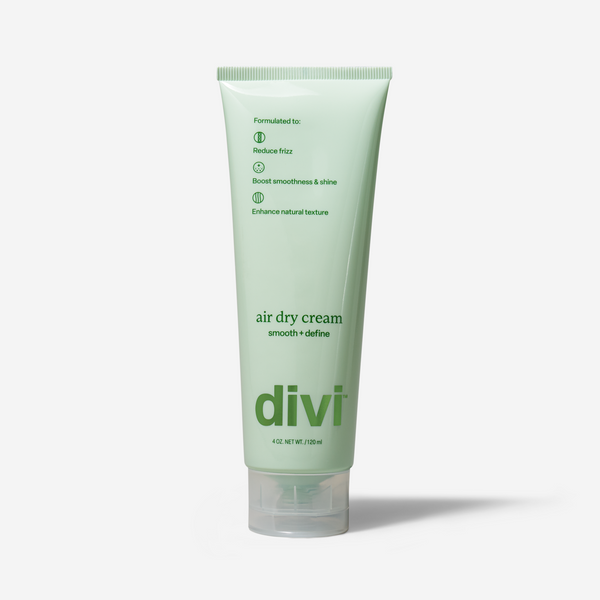
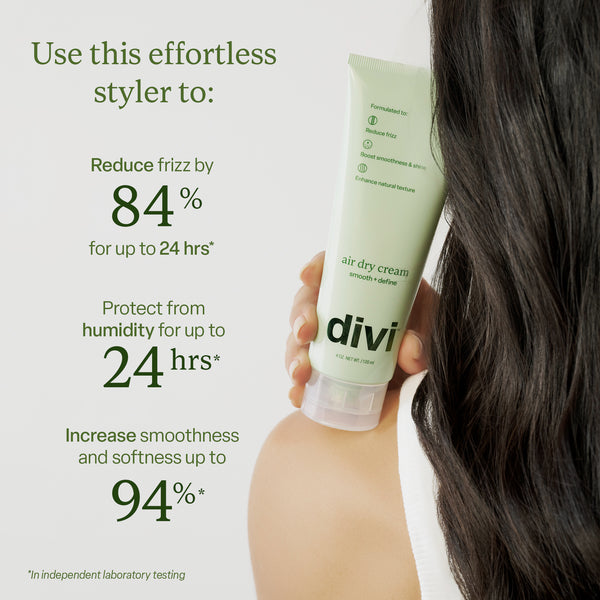

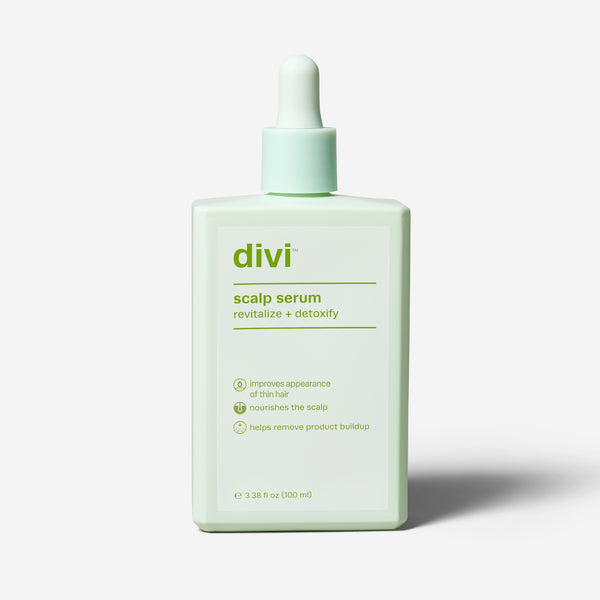

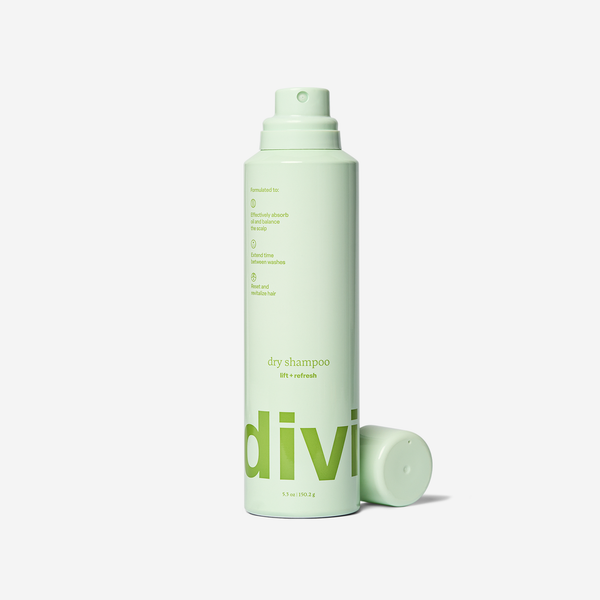

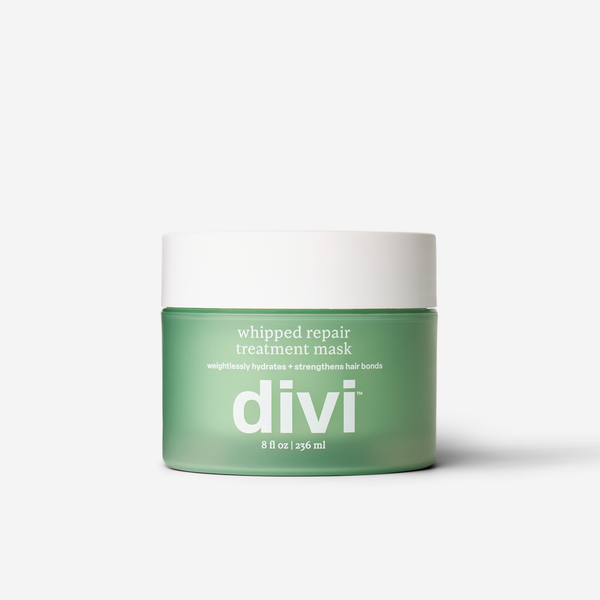
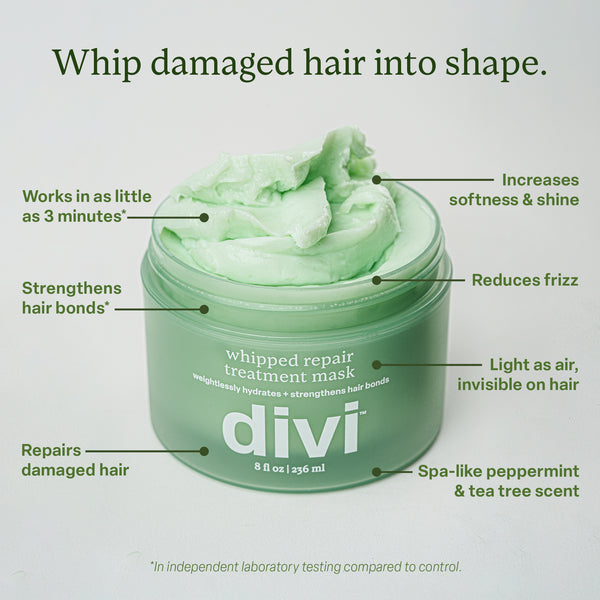
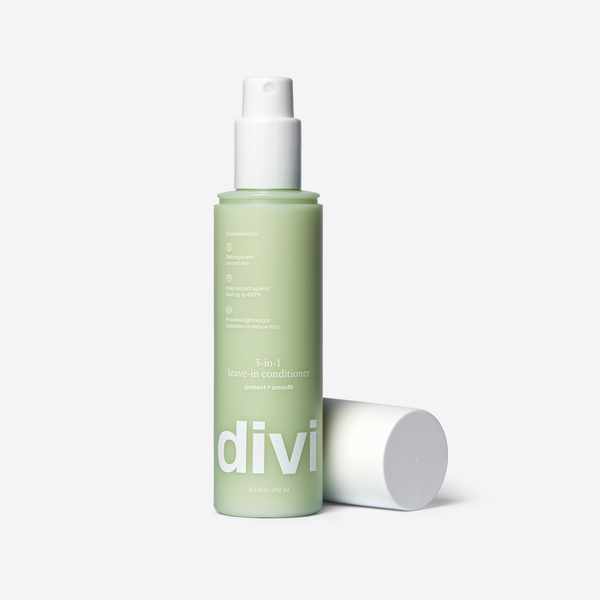

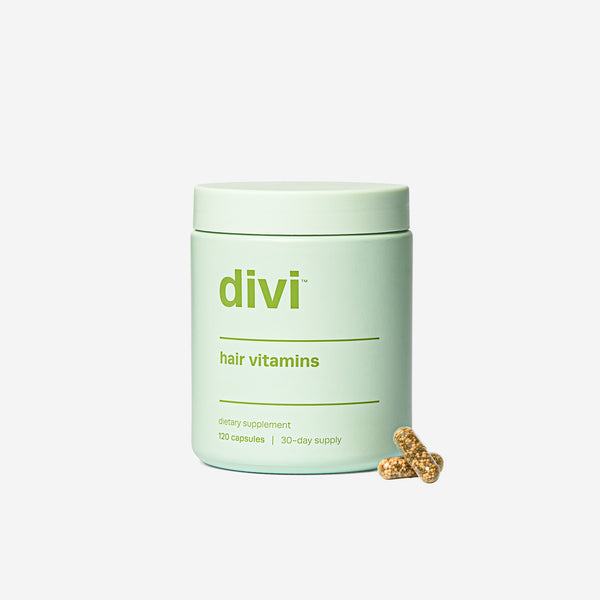
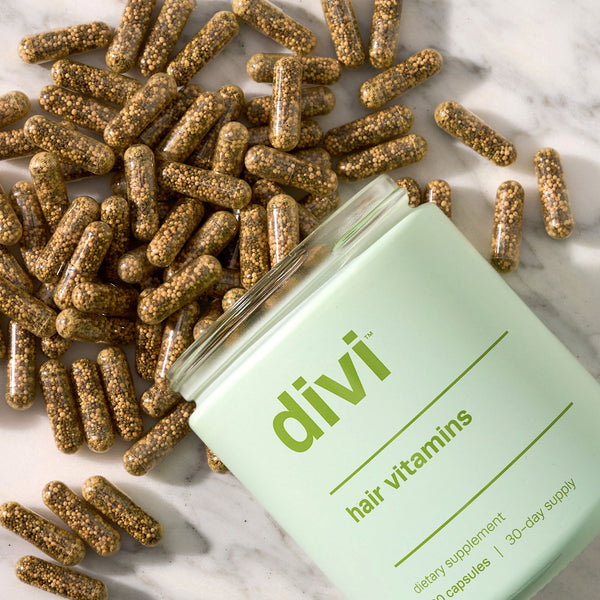
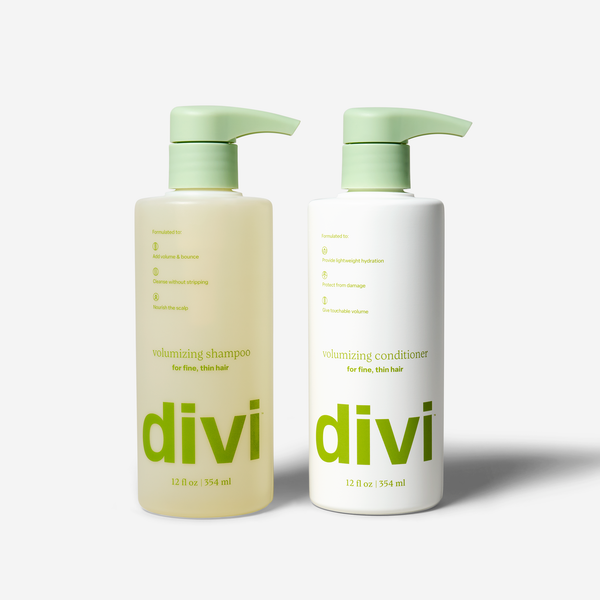





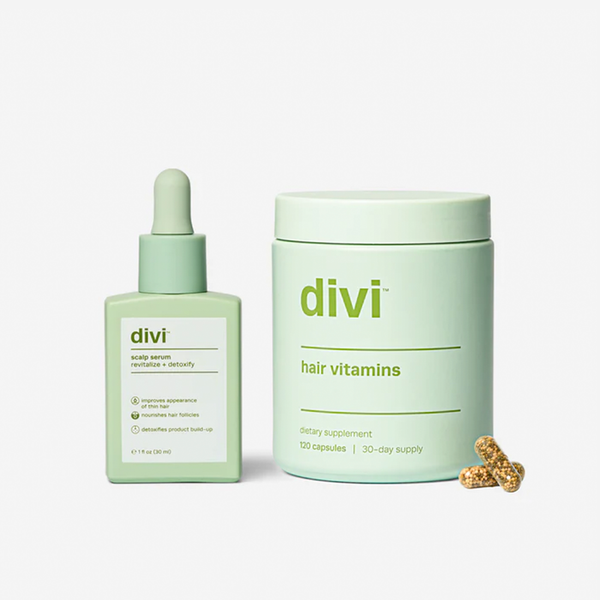
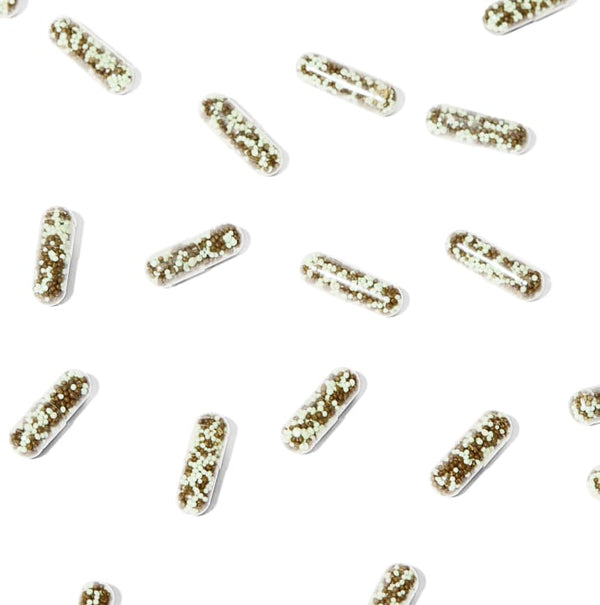
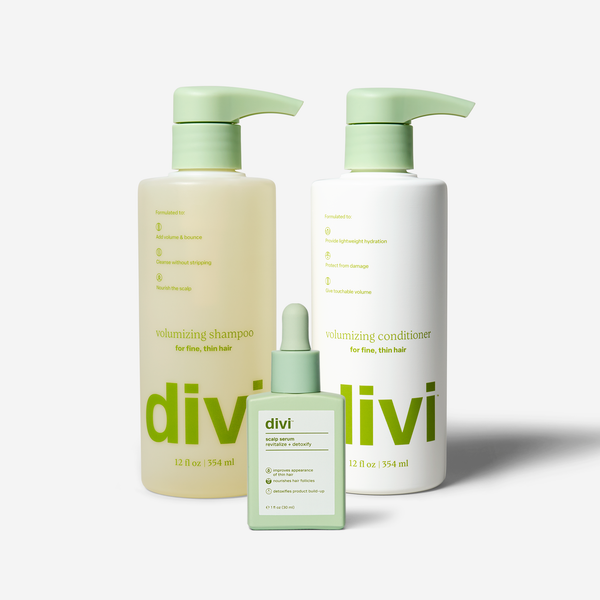
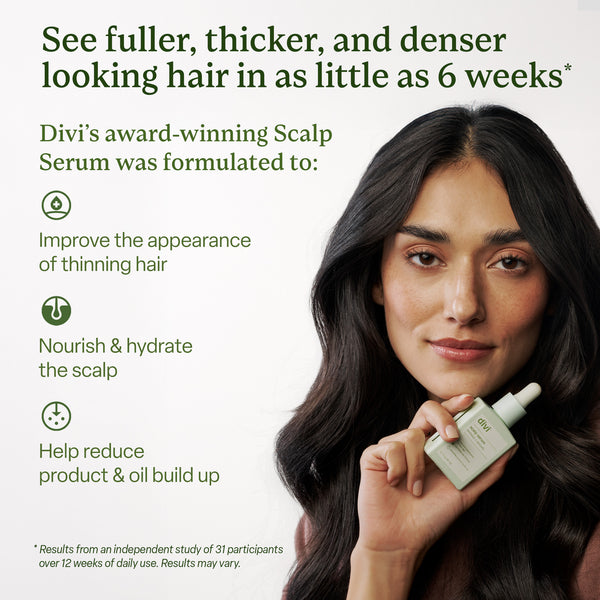











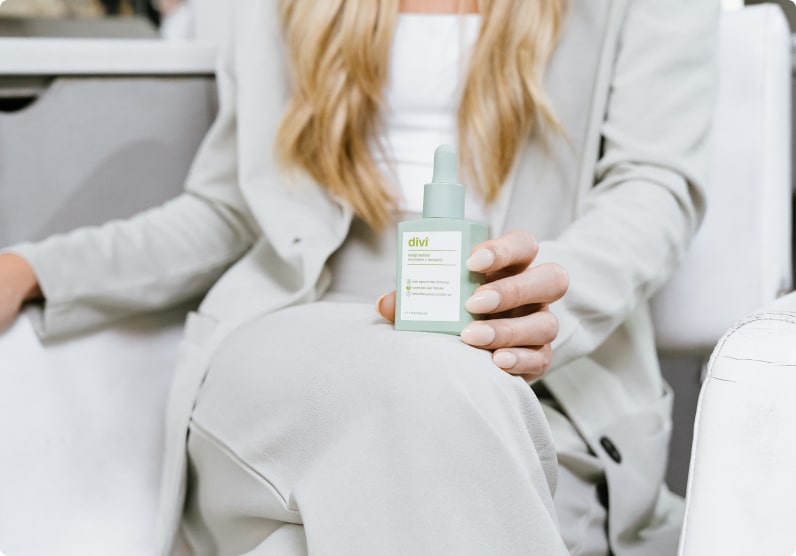






 30ml Scalp Serum
30ml Scalp Serum
 100ml Scalp Serum
100ml Scalp Serum
 Volumizing Shampoo
Volumizing Shampoo
 Hydrating Shampoo
Hydrating Shampoo
 Travel-Sized Volumizing Shampoo
Travel-Sized Volumizing Shampoo
 Travel-Sized Hydrating Shampoo
Travel-Sized Hydrating Shampoo
 Volumizing Conditioner
Volumizing Conditioner
 Hydrating Conditioner
Hydrating Conditioner
 Travel-Sized Volumizing Conditioner
Travel-Sized Volumizing Conditioner
 Travel-Sized Hydrating Conditioner
Travel-Sized Hydrating Conditioner
 3-in-1 Leave-In Conditioner
3-in-1 Leave-In Conditioner
 Best Sellers Bundle
Best Sellers Bundle
 Volumizing Starter Bundle
Volumizing Starter Bundle
 Hydrating Starter Bundle
Hydrating Starter Bundle
 The Healthy Hair Bundle
The Healthy Hair Bundle
 Hair Vitamins Trio
Hair Vitamins Trio
 Dry Shampoo
Dry Shampoo
 Hair Vitamins
Hair Vitamins
 Volumizing Shampoo & Conditioner
Volumizing Shampoo & Conditioner
 Travel-Sized Volume Duo
Travel-Sized Volume Duo
 Hydrating Shampoo & Conditioner
Hydrating Shampoo & Conditioner
 Travel-Sized Hydrating Duo
Travel-Sized Hydrating Duo
 Travel-Sized Dry Shampoo
Travel-Sized Dry Shampoo
 Travel-Sized Dry Shampoo Trio
Travel-Sized Dry Shampoo Trio
